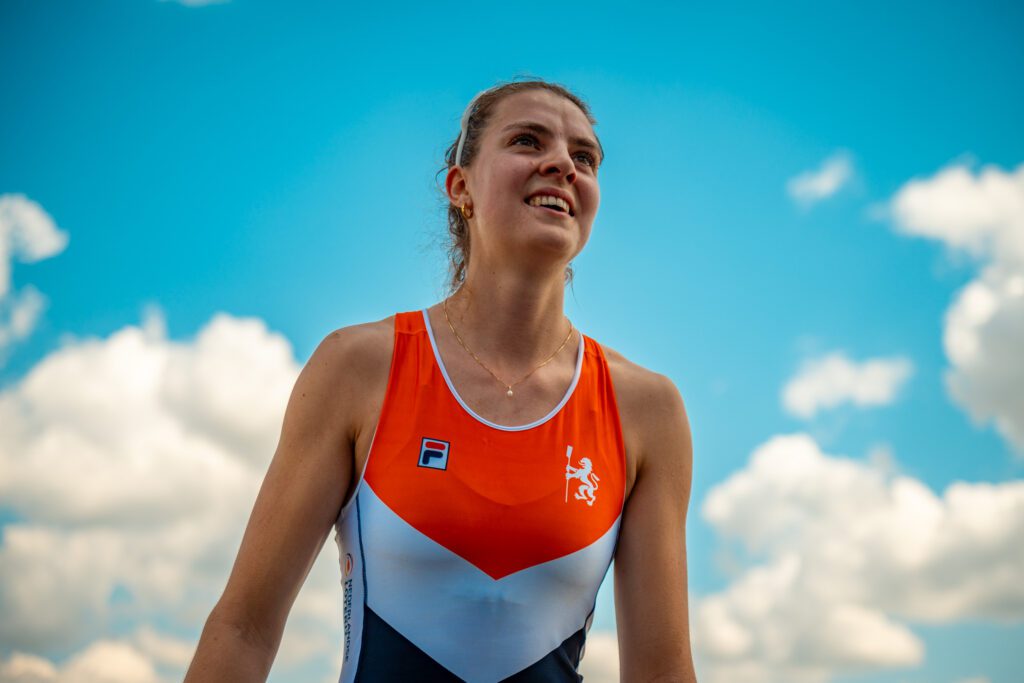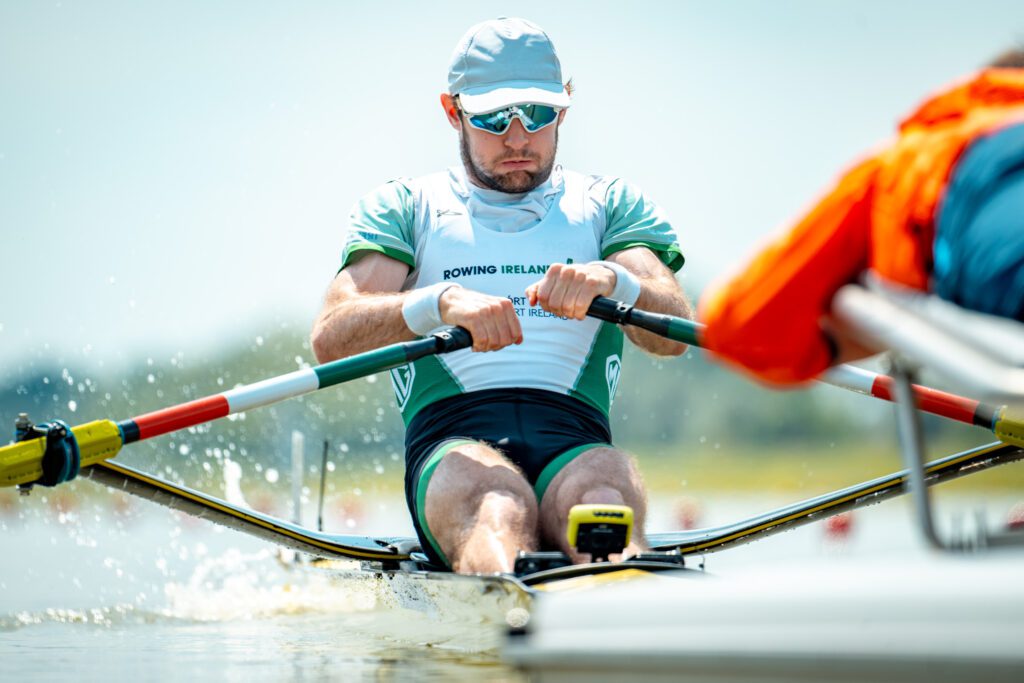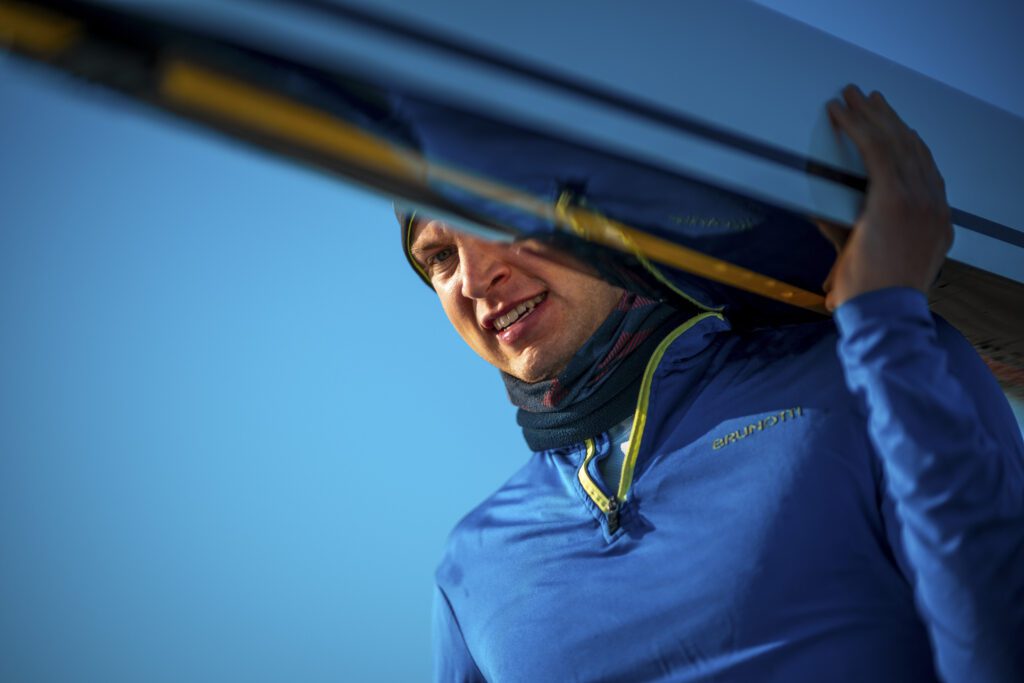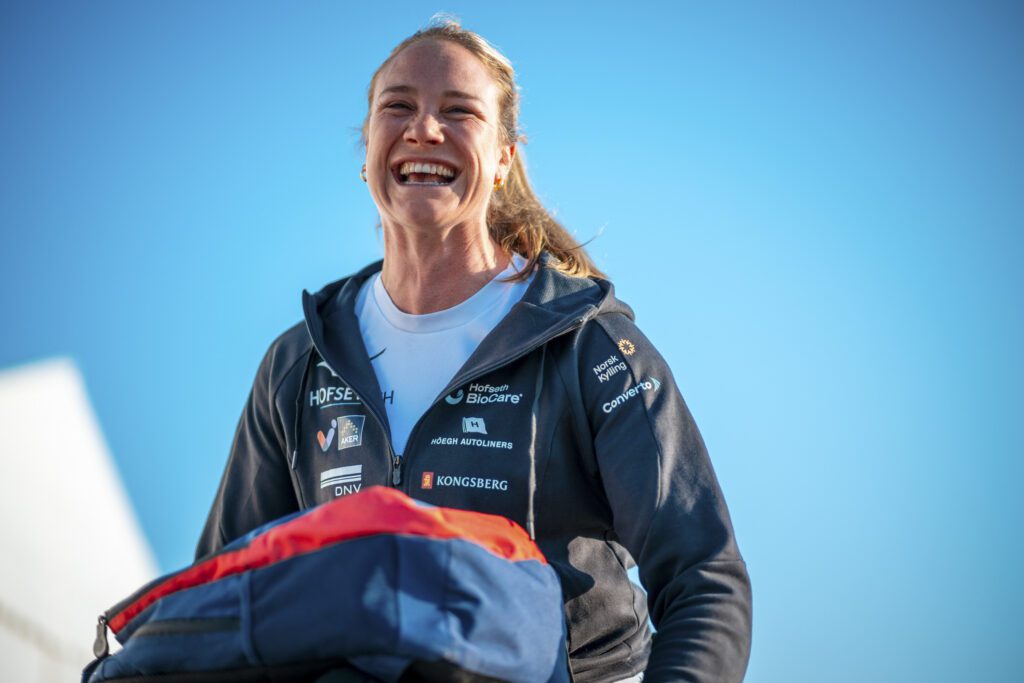More wind, more Games qualification, but Friday finally saw the first medals awarded, mostly to non-Games events but also to the newly-important PR3 mixed doubles. Australia’s Jed Altschwager and Nikki Ayers, holders of the world best time from Varese in June, confirmed their current dominance by taking a solid lead which increased steadily through the race to claim gold from the USA and will make them early favourites to claim the inaugural gold in Paris.
Behind this duo the awful ‘race not to come last’ should have been on the menu but it turned out that France, Germany and Britain quickly established themselves as good bronze-medal contenders and pulled away from Brazil, who became the only ones out of the six to miss out on a 2024 place. Britain’s new PR3 duo had a good surge in mid-race but it was eventually France who regained the spot on the podium in the last quarter. To round off the afternoon Italy won three straight-final nearly extinct lightweight events in a row and Ukraine did the same in two non-Paralympic PR events to plonk the two countries on top of the medal heap, a position unlikely to last past 3pm on Saturday.
With discussions about the racing programme at the worlds high on the international federation’s agenda for the next 12 months, the two events most likely to survive a cull are the lightweight singles, from which an interesting number of openweight Olympians have now come and will probably continue to come in future years. Competing against similar-weight rivals for a while builds experience and those from small rowing teams outside Europe can often qualify for the Games via the continental route. This time Andri Struzina (SUI) rowed down Niels Torre (ITA) for LM1x gold, while a solid trio burned through Martine Veldhuis (NED) and then fought it out in the closing stages to end with gold for Siobhan McCrohan (IRL), silver for Kenia Lechuga (MEX) and bronze for Sophia Luwis (USA) in the lightweight women’s single.
“Every suffering, every blood, every tear paid out.”
Damir Martin
The Struzina result underlines the strength of the Swiss lightweights, since he is the backup for their incredible double which on Sunday will hope to take the the near-invincible 2022 world champions Ireland to the cleaners. The women’s event was absolutely fascinating, McCrohan becoming world champion at the age of 36 after returning to the sport following a break of seven years, Lechuga claiming Mexico’s first ever world medal and Luwis defeating major injury after a nasty car-crash just over a year ago and a long time semi-conscious in critical care, during which she remembers thinking she was on a rowing trip in Croatia.
“I was pinballing down between the two lanes, so it was a bit all over the place”, said McCrohan after the race. “I’m so happy, it’s my first final in the world championships”, said Lechuga. “These conditions are mine — [where I train], it’s like being home.” She will now look to qualify for Paris in the open single, which would be her third Olympics: she finished 12th in Rio and 16th in Tokyo.
Smoking hot rivalries were renewed in the morning semi-finals, including Roman Polianskyi (UKR) versus Giacomo Perini (ITA) in the PR1 men’s singles, a contest won by a mere 1.71 seconds by Perini this time, and Tara Rigney (AUS W1x) versus Kara Kohler (USA), that one won by the American, though she may have a harder time in the single given the qualifiers from the other semi. Erik Horrie (AUS) should have been up against Benjamin Pritchard in the other PR1 men’s singles semi, but had an off day and ended up trailing in third behind Pritchard and Germany’s Marcus Klemp despite owning sheltered lane one. “That’s the joys of rowing”, Horrie said afterwards. “Medals aren’t given out today. I’m a true believer of it doesn’t matter what lane you’re in, I decided to just shut it down and come on in, and take the third place, it’s fine.”
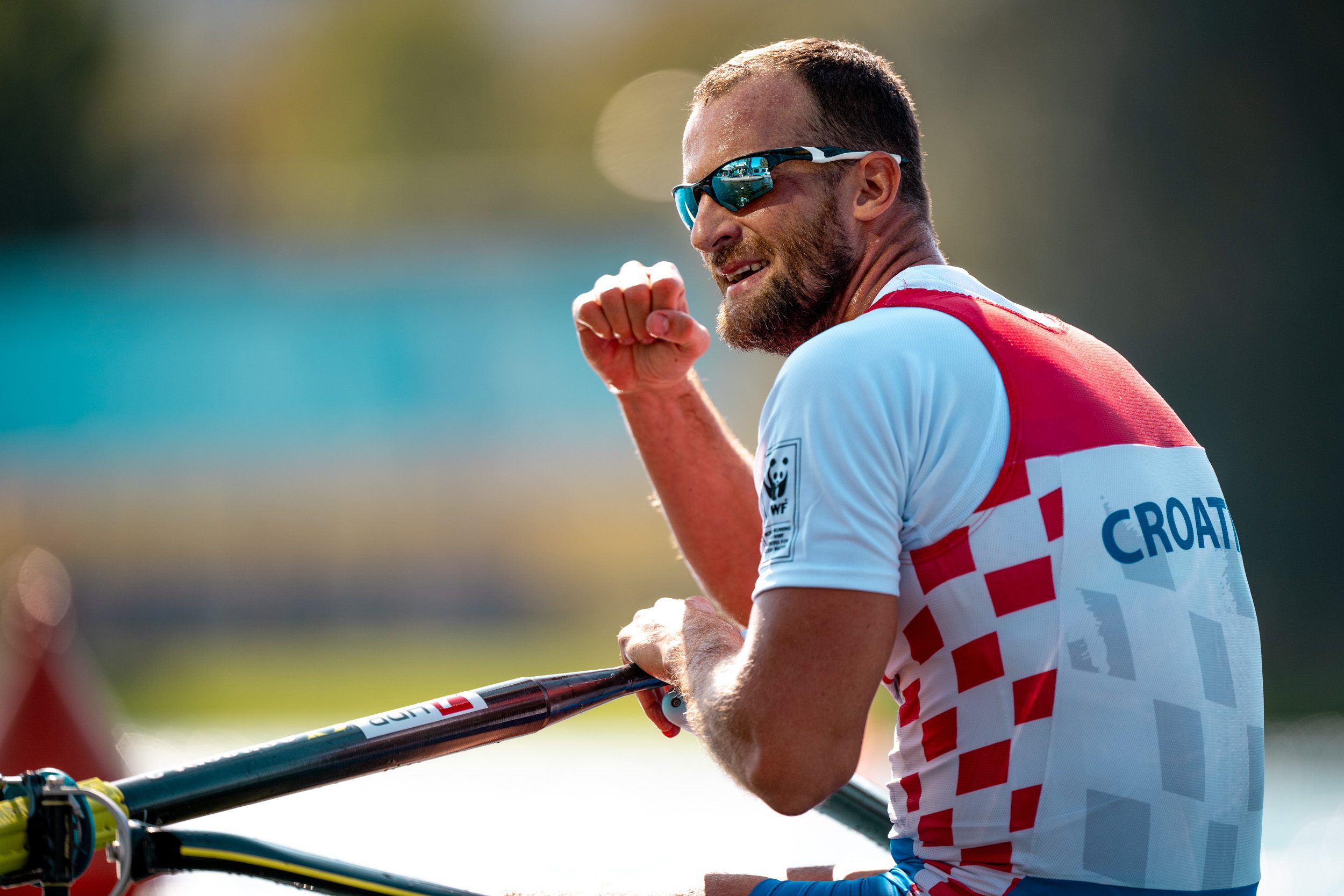
Photo A gleeful Damir Martin after earning his ticket to Paris
Credit Benedict Tufnell
In both the men’s and women’s singles the reigning world and Olympic champions came up against one another, a feast for spectators. First we were treated to the sight of world M1x champion Olli Zeidler duffing up Olympic singles champion Stefanos Ntouskos, while a gleeful Damir Martin beat AIN athlete Yauheni Zalaty to the third finals qualification place two years and nearly six weeks since he last got to the medal race (the Olympics, where he took bronze). “Fourth Olympics — crazy, crazy, crazy, crazy”, said Martin. “I feel somewhere between water and sky, and more a little bit in the sky — knocking on heaven’s door. The main goal this season is achieved so every suffering, every blood, every tear paid out.” The event leaders’ race was a rehearsal for Sunday where they will be joined by the rest including the Netherlands’ latest sculling star Simon van Dorp, who astonished Sverri Nielsen (DEN) and Thomas Mackintosh (NZL) by beating them cleanly.
Then it was the turn of the women, Emma Twigg (NZL) and Karolien Florijn (NED) hustling one another throughout the women’s singles semi: that one had Florijn always on top so again the more recent champion was on better form. “If someone had told me when I was at my first Olympics I’d be doing five I’d probably have laughed at them”, said Twigg. The loser in the women’s event was Alexandra Foester, beaten out of the A-final by Bulgaria’s Desislova Angelova who has been on form all week. Foester, aged 21, could easily have been doing under-23 racing still, but has chosen to mix it with the seniors this season and will be agonised that she lost out after being only a few seconds behind the two best in the world last year.
The field is closing up on the Croatian men’s double, the Sinkovic brothers, who had to tough it out to keep ahead of Ireland in their semi, while Spain capitalised on the shelter of lane 1 and made up for earlier team disappointments with a classic third place over the rest of the field, hanging on after starting fast but then being passed. Experienced Dutchmen Melvin Twellaar and Stefan Broenink looked better than they have since taking Olympic silver two years ago and posted a quicker time than the Sinkovics while under noticeably less pressure from rivals Italy and China. “It’s a unique dynamics, this kind of world championships where everyone has to qualify”, said Broenink. “It’s already a sneak preview of the Olympics.”
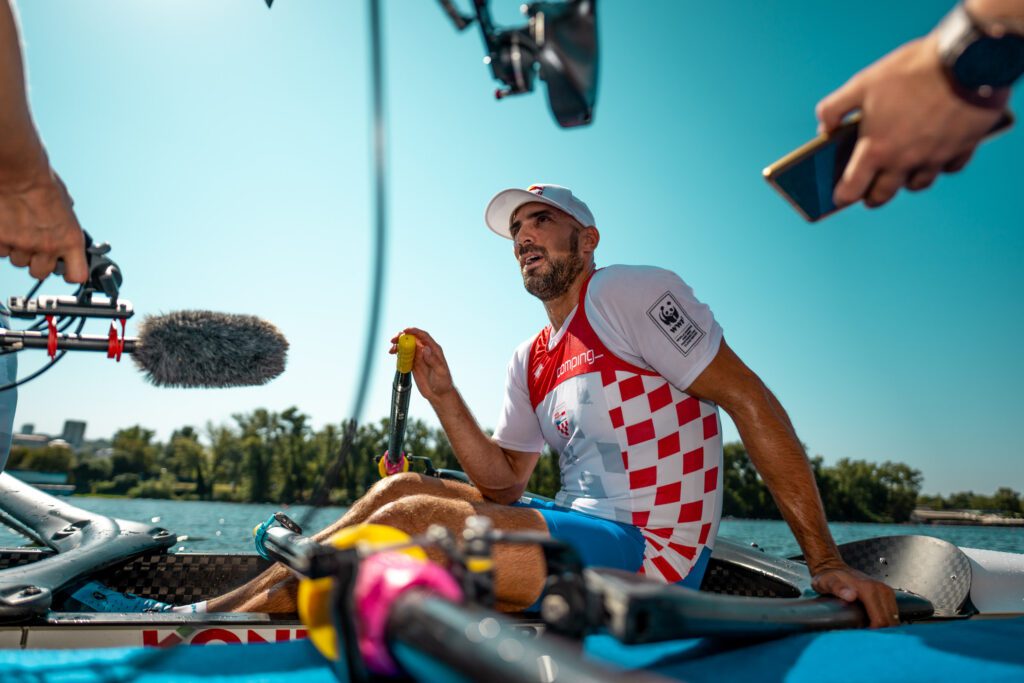
Photo The field is closing up on the Croatian men’s double, the Sinkovic brothers
Credit Benedict Tufnell
In the women’s doubles the Irish chased the USA all the way, with China giving up just before the line once they realised that France had already shot through them unexpectedly to take third. Romania’s extraordinary world champions Ancuta Bodnar and Simona Radis may not yet have beaten Aldersey and Kehoe’s 2014 world best time, and won’t here given the conditions, but they barely had to tickle the rate up to take the second semi by clear water over Lithuania and New Zealand so must be odds-on favourites to retain their title unless the USA or Ireland can find a way to stop them.
“If someone had told me when I was at my first Olympics I’d be doing five I’d probably have laughed at them.”
Emma Twigg
The eights reps were nailbiting, Germany’s men’s eight grabbing its race by the scruff of the neck only to find themselves the subjects of a demonic Romanian row-through, the boys in red, yellow and blue on a mission to prove the squad still has what it takes after the (doubling-up) four missed out on the A-final the day before. Romania got it by a 0.6-second gnat’s whisker and Germany just about managed to hang on in the face of Canada’s closing sprint, to bag the last place in Sunday’s final. The eights have a brutal five-to-Paris qualification so nobody can yet rest on their laurels. The women’s rep, with a slightly smaller event, was four to go through, and within two minutes Germany and China were already so far back they were never going to make it. That left Britain, Canada and Australia feeling comfortable, until Australia turned the screw on leaders Great Britain and bagged top spot by 0.05 seconds in a furious scramble to the line with both rating 40-41.
